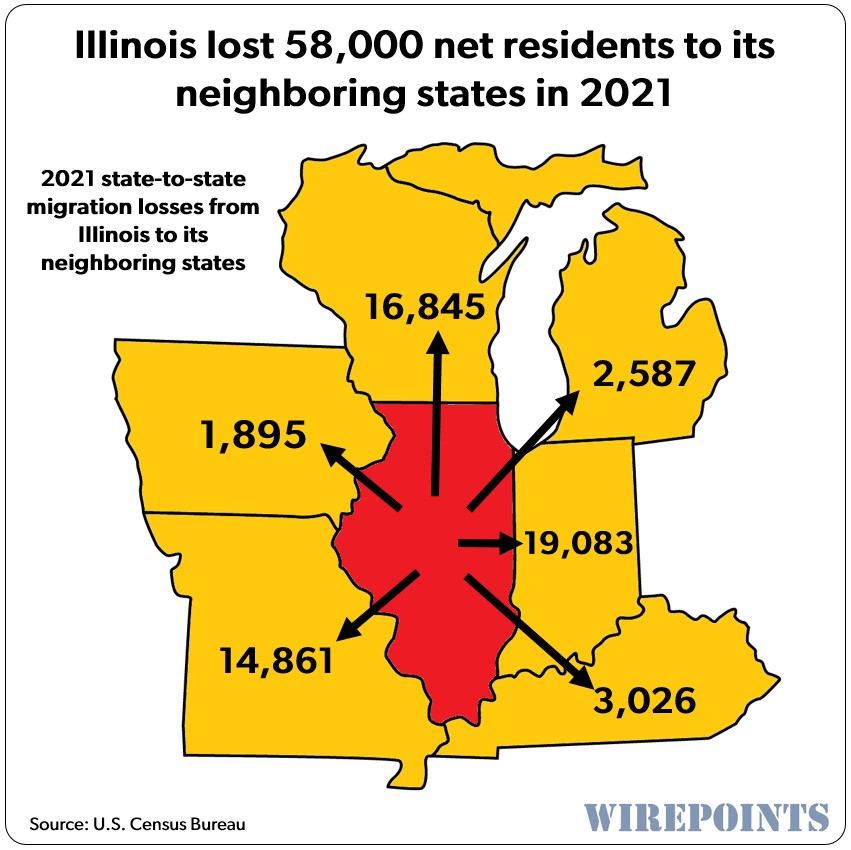Is This Any Way to Run a City’s Schools?
Leaked CTU Proposals Won’t Do Anything to Improve Schools’ Poor Performance

More than perhaps any other state, forced-dues Illinois is a terrifying illustration of why politicians should never hand government union bosses monopoly bargaining power over how public servants are compensated and managed.
Largely because Prairie State politicians adopted a law enshrining this Big Labor privilege four decades ago, today the state is facing a fiscal catastrophe.
According to a recent analysis by the nonpartisan Illinois Policy Institute, a think tank with offices in Chicago and Springfield, the state’s inflation-adjusted expenditures on government pensions soared by a flabbergasting 584% from 2000 to 2022.
That’s nearly 28 times as great as Illinois’s overall inflation-adjusted increase in public expenditures over the same period.
Despite the huge share of Illinois public expenditures that go into covering the cost of government pensions, and despite an overall state-local tax burden higher than in 43 of the other 49 states, the Prairie State’s public pensions are currently only 39% funded, according to the Pew Charitable Trusts.
That’s the worst pension funding ratio of any state.
“The union-label politicians who control Springfield have turned Illinois into a Shangri-la for power-thirsty government union monopolists,” observed National Right to Work Committee Vice President John Kalb.
“This is now truer than ever before as a consequence of the 2022 enactment of a ballot measure effectively giving union bosses carte blanche to force public employers to bend to their will on almost any issue, which the union brass pushed through after outspending worker freedom supporters by over 5-to-1.
“Of course, union kingpins are aware that, as long as Illinois taxpayers have some other state to go to where they know they’ll be treated less foully, more and more of them will take advantage of the opportunity.
“In 2021, Illinois netted a loss of 146,000 residents to other states, including a loss of 58,000 to its six neighbors, where an average of fewer than a third of public employees are subject to union monopoly bargaining, compared to over half in Illinois.”
That’s why, ever since they secured passage of the radically pro-union monopoly Amendment One last November, union bosses and their PR machine have been pitching Illinois as a “model” for a host of other states.
“It’s a simple strategy. The more states that adopt Amendment One ‘copycat’ measures, the fewer states will be left to which fed-up Illinois taxpayers can flee to get away from this oppressive regime,” explained Mr. Kalb.
In an analysis published late this February by the pro-forced unionism Illinois Economic Policy Institute, Big Labor academics Robert Bruno and Frank Manzo predicted that up to 12 states could okay schemes similar to Amendment One in the near future.
Early this summer, lawmakers in California were already debating a proposed constitutional amendment with wording very similar to Amendment One.
Parallel initiatives are on the table in Pennsylvania and Minnesota. Like Amendment One, the current California, Pennsylvania, and Minnesota gambits would prohibit Right to Work for private-sector employees in addition to constitutionalizing union monopoly bargaining in the government sector.
“It will be a great irony if Illinois, which has arguably done more to expose the destruction done by expanding special legal privileges for union bosses than any other state, becomes a model for other troubled, but so far less dysfunctional states,” said Mr. Kalb.
“But the danger it could happen is growing.”
This article was originally published in our monthly newsletter. Go here to access previous newsletter posts.
To support our cause and help end forced unionism, go here to donate.

Leaked CTU Proposals Won’t Do Anything to Improve Schools’ Poor Performance

Wherever Big Labor wields the power to collect forced union dues, union bosses funnel a large share of the confiscated money into efforts to elect and reelect business-bashing politicians. Employment growth tends to lag as a consequence.

Members Insist They Keep Pro-Right to Work Campaign Promises